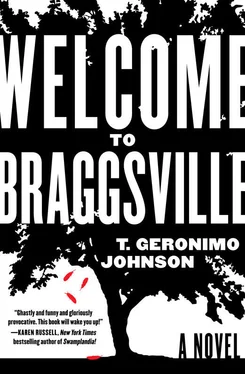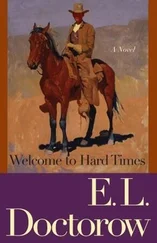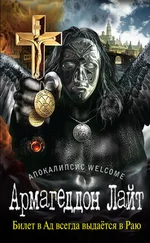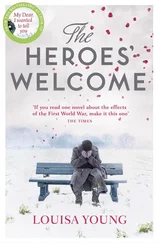What’s back there?
Daron shrugged.
Everyone’s heard the urban legends about the murder victim whose last act is to scrawl his assailant’s name on the floor in blood. Sounds like that’s happening here.
Maybe. But I can’t right figure what that means, Agent Denver.
Still playing it close to the chest? Okay. That’s not the real reason I’m here. How about Vallejo, California? Six Flags? He paused to appreciate the surprise on Daron’s face. You have done this before, but this time was different. Things went wrong in Braggsville. But not how you expected. So what are you trying to tell me? Tell me about that. Six Flags tells me you are a political agitator, not one to antagonize. There were protests almost every semester you were at Cal, that your thing?
No. Daron rubbed his face wearily.
What were you trying to reveal here? What were you trying to tell me? At least tell me about Six Flags, and maybe I can figure out the rest. How about that?
A belch escaped him unexpected.
Denver fanned the air. I won’t offer to buy you a cheeseburger for lunch.
Daron laughed. He shifted and the seat cover clacked. Why would anyone want to sit on an abacus? He felt tight inside, like his ribs were poking his lungs. [What had he thought when Candice came stumbling into the backyard? The only sensible thing. If Louis was haranguing people and wearing blackface and Candice was dressed as a slave, of course the Gulls might retaliate, like when your parents offered to really give you something to really cry about.] He recalled that child’s drawing from the inquest, the one hanging on the wall behind the Changs, the one with the yellow coils of smoke hazing the roof. That was what the 4 Little Indians had done, stoked a blaze in a house without a fireplace or chimney, and his head felt too much like that house.
How had they discovered Ishi anyway? A play, wasn’t it? Yes, a play. Candice had wanted to go. Was it really her idea? You aren’t sure. Louis was cramming for an exam and backed out. Charlie went along, though, and liked it. You were angry. She was angry. Charlie was a Saints fan, as he described it, about all things race. Best advice my father ever gave me: When you know your team can’t win, you hope, pray, and cheer, but don’t bet, curse, or get in anyways angry when they lose. That’s how you live without your heart drawing up into your ass.
You kicked the wall after that show. Shucked your throat to work up enough phlegm to dot every light post in the plaza. Candice, too. Ishi: Last of the Yahi, a play, had done nothing for your evening plans: play, eat, smoke, drink, PlayStation. It was Wednesday, that semester’s Friday. Lower Sproul Plaza, UC Berkeley — California even — all rifling indifferent through your every illusion, all cutting a profile like Lyle Grant when you found him neck-deep in your locker. It stung the same after, too, always throwing chin over the shoulder, shading the combination (his was next to yours) and window-shopping every opportunity for revenge. Lyle, everyone knew, was stubborn enough to argue with a sign and would just as soon kill himself to avoid caring about another person, an oak toad done up as a bullfrog. But California, once plural, that LL’s going back to, the Mamas and Papas’ dream, Cali whose Wiki page you memorized that summer before freshman fall, the thirty-first state, named after a fictional paradise peopled by black women ruled by Calafia the warrior queen, thought for hundreds of years by the Spaniards to be an island, was part of the same mass, another undigested pea in a big pile of shit.
(Maybe that Salon de Chat prof had a reason for giving YOU an unofficial tour of campus and its unregistered residents: the man under his bicycle like an upturned turtle, the tai chi practitioner in court jester shoes, the man who wore many hats like a Dr. Seuss character.)
And you should have known you couldn’t escape Braggsville. Not even when your debate coach and eleventh-grade English Lit warden, Mr. Buchanan, the mayor’s brother, called you — Hey Ron-Ron! — into his lounge, one of the few single-occupancy offices, one of the fewer even with a couch, and beckoned you sit closer and closer, until your knees were nearly touching, until you could smell Old Spice and cold fries, took you in with his eyes, and said more than asked, Your parents didn’t go to school?
You tensed, recalling that fifth-grade workshop about how some kinds of people preyed on the weak and poor, about stranger danger not being all strangers, which was why you couldn’t always spot the dangers. The teacher had posted pictures on the wall of cab drivers and policemen. The entire class had acted it out even. Don’t get scared. L.A.F.! Loudness. Acceleration. Focus. Yell loud for help, and loud for them to stop. Run as fast as you can to the nearest authority all the while imagining yourself accelerating like the fastest car in the world. Focus on recalling the details so you can be a helpful witness.
Instead you W.I.S.H. Want. Imagine. Solicit. Hope.
Behind you a door. May as well be closed. You know what’s in those halls. Before you are holidays at Mr. Buchanan’s home with Mrs. Buchanan’s pearls flashing and the gaudy jewelry tinkling at her neck. Mr. and Mrs. B, as they preferred to be known, seated at opposite ends of their hand-carved oak table, long as tomorrow, the edge traveled by the same Victorian scroll that adorned the dining room wainscoting in the family’s English estate house all those generations ago. (Same as the Braggs, for the Braggs and Buchanans were cousins.) Before you is the side table (nothing but dining on the dining room table), where they stack the wrapped books they individually selected for every Gully student at Christmas, and a few lucky white ones, too. And everyone knew Mr. Buchanan had friends, special students, apprentices, those whose potential deserved prodding and whose prospects deserved probing, and you — for the first time since tenth grade, when you learned that more degrees meant more money, and a bigger vocabulary meant a bigger paycheck — were not ashamed to admit that neither of your parents went to school, withholding that your father was doing something online with economics. Yes, you wanted more.
If you want to get out of here, I’ve found a way.
And you scooted a little closer. Waiting.
Waiting.
With two hands he presented you a folder scaled in Post-its, a suitcase of brochures, explained what first-generation college student meant, sent you on your way. Not before saying, Berkeley, they’re all good, but Berkeley is special. You can be whoever you want there. They won’t mind you not hunting. A wink. Then, he sent you on your way. No Christmas invitation. No wrapped books on the side table. No follow-up meetings. Oh the elation upon learning he’d been fired. Was to be tried. For embezzlement. Not even romantic. The elation. The relief.
Jo-Jo told you about it when you were home for Christmas vacation, how the local editorials defended him and condemned the school board for fiscal mismanagement, how he denied all allegations of wrongdoing, how he still trooped through town like a sergeant inspecting the barracks. How everyone acted like that was okay.
You would be different. Why? ¿Por qué? To prove that you were. After Ishi: Last of the Yahi, the play, you watched Candice simmer outside the theater, pace between the worn wooden benches, black and pitted as old piers in an abandoned port. She walked with short steps, nearly scampering when excited, always with the steady seesaw swish of women who stepped from the heel and not the toe. When she was drunk or angry, the small heavy bag she appeared to always imagine herself carrying became a large light one as her right arm swung wider and higher, as it did then. Your seats had been in the back. Student seating allowed for last in, first out. By the time the auditorium emptied, Candice had calmed down and taken a seat on one of the worn benches, still breathing heavily. We need to do something! More people should know about this.
Читать дальше
Конец ознакомительного отрывка
Купить книгу












